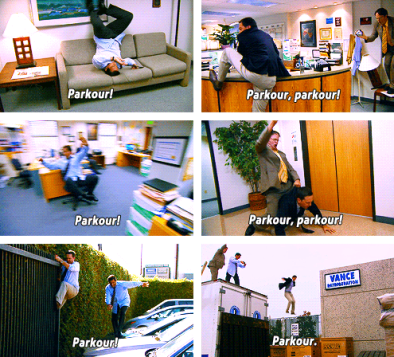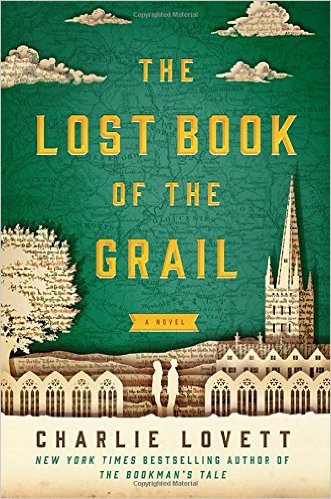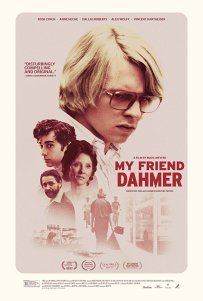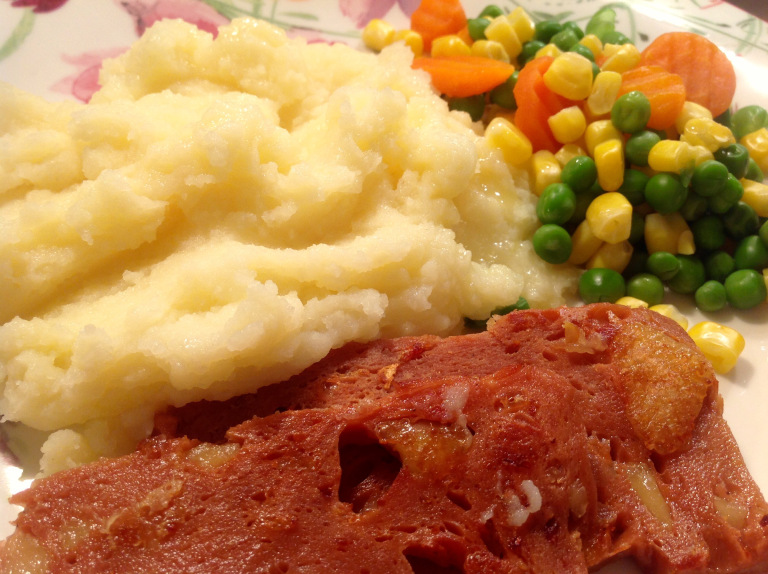Larcenet, Manu (2003), Le Combat Ordinaire, Dargaud
ISBN 9-782205-054255
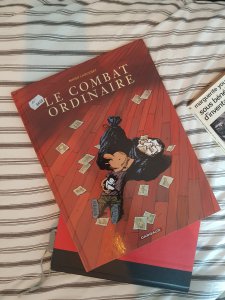 I picked up this book in a Parisian comic book shop yesterday and read it all the way through on the Metro ride home. Granted, it’s not very long. That said, I haven’t been this impressed with a comic book purely by the way it’s written in a long time, so I’m sitting here to give you a quick shove. Go read this book. It’s called Ordinary Victories in English translation (published by Europe Comics), but there’s nothing ordinary about it. My caveat here_ I’ve only read volume 1, God knows the book might fall apart in later installments (there are four overall), but I cannot see that happening. Manu Larcenet is a fantastic writer, whose artwork unexpectedly complements his stories of love, heartbreak, war and disillusionment. I’ll admit – when I was recommended the book in the shop, I leafed through it, and wasn’t bowled over. Funny faces, bulbous noses, dudes smoking weed. None of this was new, none of this seemed worth the time and money to engage with it. For some nebulous reason I picked it up anyway, and I find it hard to summarize what an achievement I am finding this book to be. I was moved, not just by the awful cliffhanger ending to the book, but also by the enormous amount of humanity that Larcenet offers his readers. Ultimately, this book is about who we are as people, what we value and what holds us together as communities. Set against the backdrop of the 2002 Presidential elections in France, it asks us to understand what it means for France that a fascist, Jean-Marie Le Pen, was able to get into the runoff against Chirac, what it means for us on the left or even center that a substantial amount of the country could have embraced violent cynicism as a political philosophy. It’s curious that I am reading the book today, as Le Pen’s daughter has gathered an even larger part of the vote in the recent French elections, and Trump won last November’s election in the US, and this Sunday, our own fascists are poised to win a historic victory and become the third largest party in parliament. Reading it as a person who is questioning some of his own choices in life and trying to find the glue that connects him to other people, this comic had a particularly strong resonance.
I picked up this book in a Parisian comic book shop yesterday and read it all the way through on the Metro ride home. Granted, it’s not very long. That said, I haven’t been this impressed with a comic book purely by the way it’s written in a long time, so I’m sitting here to give you a quick shove. Go read this book. It’s called Ordinary Victories in English translation (published by Europe Comics), but there’s nothing ordinary about it. My caveat here_ I’ve only read volume 1, God knows the book might fall apart in later installments (there are four overall), but I cannot see that happening. Manu Larcenet is a fantastic writer, whose artwork unexpectedly complements his stories of love, heartbreak, war and disillusionment. I’ll admit – when I was recommended the book in the shop, I leafed through it, and wasn’t bowled over. Funny faces, bulbous noses, dudes smoking weed. None of this was new, none of this seemed worth the time and money to engage with it. For some nebulous reason I picked it up anyway, and I find it hard to summarize what an achievement I am finding this book to be. I was moved, not just by the awful cliffhanger ending to the book, but also by the enormous amount of humanity that Larcenet offers his readers. Ultimately, this book is about who we are as people, what we value and what holds us together as communities. Set against the backdrop of the 2002 Presidential elections in France, it asks us to understand what it means for France that a fascist, Jean-Marie Le Pen, was able to get into the runoff against Chirac, what it means for us on the left or even center that a substantial amount of the country could have embraced violent cynicism as a political philosophy. It’s curious that I am reading the book today, as Le Pen’s daughter has gathered an even larger part of the vote in the recent French elections, and Trump won last November’s election in the US, and this Sunday, our own fascists are poised to win a historic victory and become the third largest party in parliament. Reading it as a person who is questioning some of his own choices in life and trying to find the glue that connects him to other people, this comic had a particularly strong resonance.
The protagonist is a 20something photographer who is unhappy about his job, though he still loves taking pictures, and has made enough money to be able to live (frugally) in the countryside for a year or so without being forced to take another job. He doesn’t do a big sweeping assessment of his life – he just takes down all his photos, and takes walks through the countryside with his rancorous cat Adolf. He meets farmer, smokes some weed, and, eventually, through an injury to his cat, falls in love with a veterinarian with whom he begins a loose relationship. The book begins on a psychoanalytic couch, and we may want to read his trip to the sticks as a kind of liberating move, but we quickly realize that it is his way of hiding from the issues and forces in his own life. This personal journey is however quickly buttressed by a nastier political theme – his father’s (and France’s) past during the Algerian war. The common practice of torturing Algerians during that war rears its ugly head as the book progresses, again, echoing the Presidential elections that happen during the events of the book, with one of the candidates running, Mr. Le Pen, having himself participated in acts of torture. There are no flashbacks (yet), instead we learn much of the Algerian war background of some of the protagonist’s characters, including his father, in stray sentences and one dialogue. Fittingly for the protagonist’s profession, it is a photograph that sets that whole discourse in motion. In retrospect, after finishing the book, it is quite remarkable how efficient, how sharply structured and how overall well made the book is. For all that the book may seem meandering at the beginning, everything in it serves a purpose – this kind of unassuming density is always impressive to me. It means the author has a solid control both of his ideas and the way he wants to deliver them, as well as of the craft of just telling a story with well-rounded characters. Even those characters that we never really get to know are written in a way where we can glean some additional, fuller dimensions.
The only downside to the book is its extensive maleness – the main character is a man, and his interlocutors are all men, except for his girlfriend, his mother, and his brother’s wife. Of these, his brother’s wife is the most independent – she confronts him once about his behavior, but is shown to have a whole life outside of the main protagonist’s travails. His girlfriend merely serves as a foil. Now, I understand that this is a story about this one man, and some of the maleness is inherent in the material. What’s more, the male farmers, his father, and his own gender form a kind of connection to the people who have largely been responsible for the political drama, both in the present of the book, as well as in the French past: white French men. I sort of expect the other volumes to draw more on the connection here, and it’s certainly an interesting and relevant path of thought. At the same time, introspective books by men about the deleterious effects of masculinity are as common in literature as croissants in French bakeries, and I must admit that I am slowly tiring of finding yet another text caught in the maelstrom of the (self-critical) male ego. At the same time, it’s a sign of how fantastic this particular text is that I still enjoyed it greatly, bulbous noses and bulbous egos aside. This is a very good comic and you should read it. Also, it has an adorable cat!
*
As always, if you feel like supporting this blog, there is a “Donate” button on the left and this link RIGHT HERE. If you liked this, tell me. If you hated it, even better. Send me comments, requests or suggestions either below or via email (cf. my About page) or to my twitter.)
Advertisements Share this: